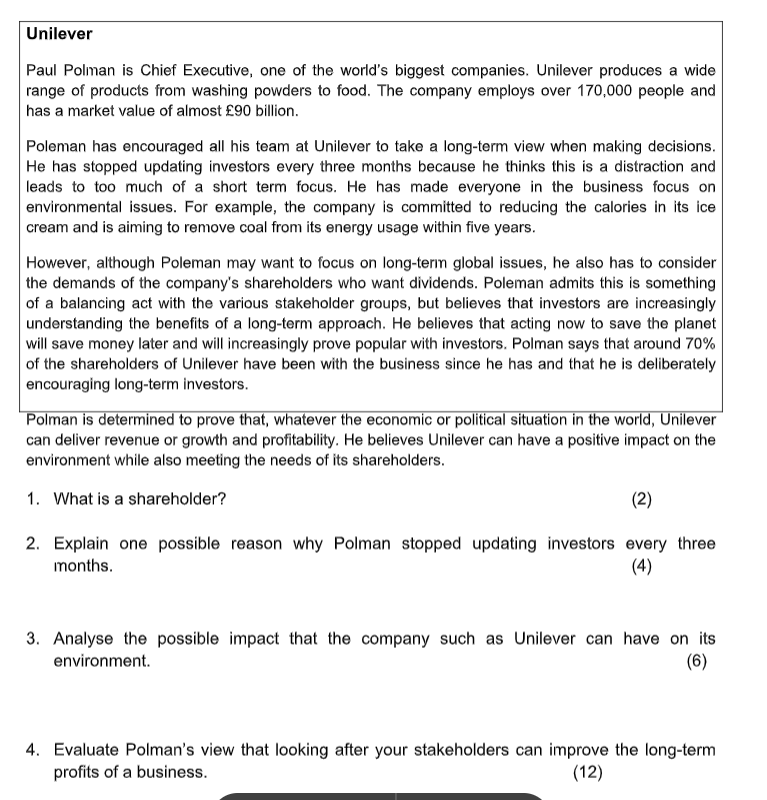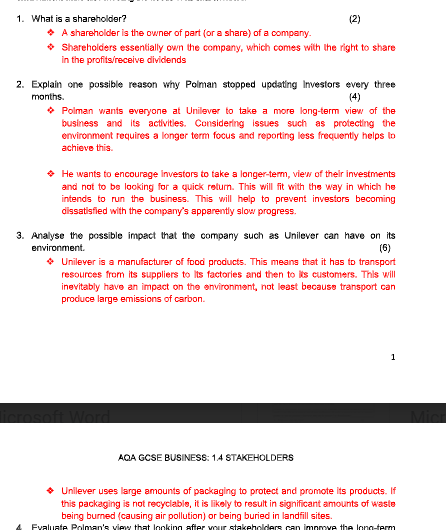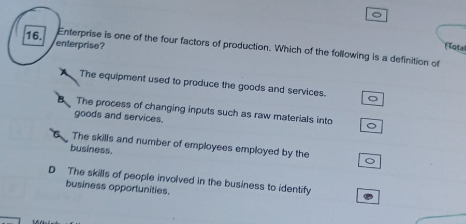1.4 - Stakeholders
1/48
There's no tags or description
Looks like no tags are added yet.
Name | Mastery | Learn | Test | Matching | Spaced | Call with Kai |
|---|
No analytics yet
Send a link to your students to track their progress
49 Terms
What is a stakeholder?
A stakeholder is an individual or group that has an interest in the behaviour and performance of a business.
Name 3 examples of a stakeholder
Customers, employees/managers, owners/shareholders, the local community, the government, pressure groups, suppliers, financiers
Which stakeholders are internal?
Employees/managers and owners/shareholders
What objectives do customers have?
Low prices, quality products and good customer service
What objectives do employees have?
High wages, good working conditions, job satisfaction + security, career progression
What objectives do shareholders have?
High + regular dividends/returns, high share price
What objectives do the local community have?
Local jobs, investment in local projects, minimal pollution + noise
What objectives do the government have?
Tax revenues, jobs (low unemployment)
What objectives do pressure groups have?
Improvements to the environment, influence actions, increase awareness of their cause
What objectives do suppliers have?
Being paid on time, guaranteed buyer
What objectives do financiers have?
High interest payments, confidence that they will be repaid
What is negotiation?
reach the desired outcome regarding one or more issues of conflict. It is
an interaction between entities who aspire to agree on matters of
mutual interest.
What is direct action?
rather than negotiation to achieve one's demands.
What is refusal to co-operate?
the ability of the business if it disagrees with the decision/actions of the
business
What is voting?
say in influencing the behaviour of a business</div>"
Are all business owned by their stakeholders?
No
Do stakeholder obejctives change over time?
Yes
Do all business have stakeholders?
Yes
Do stakeholders have different interests?
Yes
Do all stakeholders want the business to maximise profit?
No
Can businesses affect how stakeholders behave?
Yes
Can stakeholders influence the behaviour of a business?
Yes
What is an external stakeholder?
A stakeholder which is outside of the business
What is an internal stakeholder?
A stakeholder which is within the business
Why does the government want a business to be successful?
If a business employs more people, there will be less unemployment, these people will pay more tax and they will have more disposable income (income remaining after deduction of taxes, available to be spent), which will hopefully be spent on other local businesses. Also, once these people start earning, they will stop receiving money claims from the government.
Why do suppliers want businesses to be successful?
Because if the business is successful, they will require more supplies, so the supplier will have more business
Are suppliers internal or external shareholders?
External
Is the government an internal or external shareholder?
External
Are customers internal or external shareholders?
external
Is the local community an internal or external shareholder?
Are shareholders internal or external shareholders?
Internal
Are owners and employees internal or external shareholders?
Internal
Why do shareholders want a business to do well?
They will earn higher dividends and the share price will rise if the business earns more profit
What is procurement?
To obtain something (usually goods and services for a business)
Why are there stakeholder conflicts?
These groups of stakeholders all want different outcomes
What is a trade union?
An organisation who work to ensure that the interests and rights of their members (a group of workers) are protected
How do shareholders affect business activity?
- Provide funding to enable it to start up + grow
How do managers affect the business activity?
Make some recommendations + decisions that influence the business' activity
How do employees make an impact on business activity?
They may refuse to work/not work as well as they should
How do customers affect business activity?
- Give feedback + how to improve
- They can recommend the business/warn others against using the business
How can suppliers affect business activity?
- Reliability of their deliveries
How can the local community affect business activities?
- Can buy goods/services
How can pressure groups affect business activity?
- Influence customers' opinions of a business
How can the government affect businesss activity?
- Change tax levels
- Amend levels of government spending in ways that affect the business (eg. grants/funding)
What do managers do?
Responsible for implementing the decisions made by the owners and overseeing the work that's required

A business may become more profitable if key stakeholders are content with it. For
example, paying employees well and training them thoroughly might be expensive but
can make them more efficient. Efficient employees help businesses to reduce the
costs of producing a typical product. Lowering costs is an effective way of increasing
profits.
❖ Unilever’s customers may be more willing to buy its products if they meet their needs
more fully. For example, removing some of the calories in its ice cream may help to
offset consumers’ worries about their weight increasing as a result of eating the
product. Although this may involve higher short term research and marketing costs, it
could result in increased profits in the future if sales rise.
❖ Being environmentally friendly can be well received by many stakeholders of a
business, especially those that might be affected by its activities, such as people hwo
live near to the business’s premises. However, this can add to a business’s costs, for
example in using more expensive sources of renewable energy. This may result in
lower profits.
❖ The key here is that profits are more likely to increase in the long term. Treating
employees well and protecting the environment can be costly, but the benefits will
appear in the longer term in terms of increased sales and revenues. It is at this stage
that profits are more likely to increase. However, this is not certain. If competitors
adopt similar polices it can be more difficulty to achieve increased sales.

How can a buisness impact its environent?
Factories
Vehicles
Chemicals
Packaging (recycliable)?
Energy use
Transport

Got it